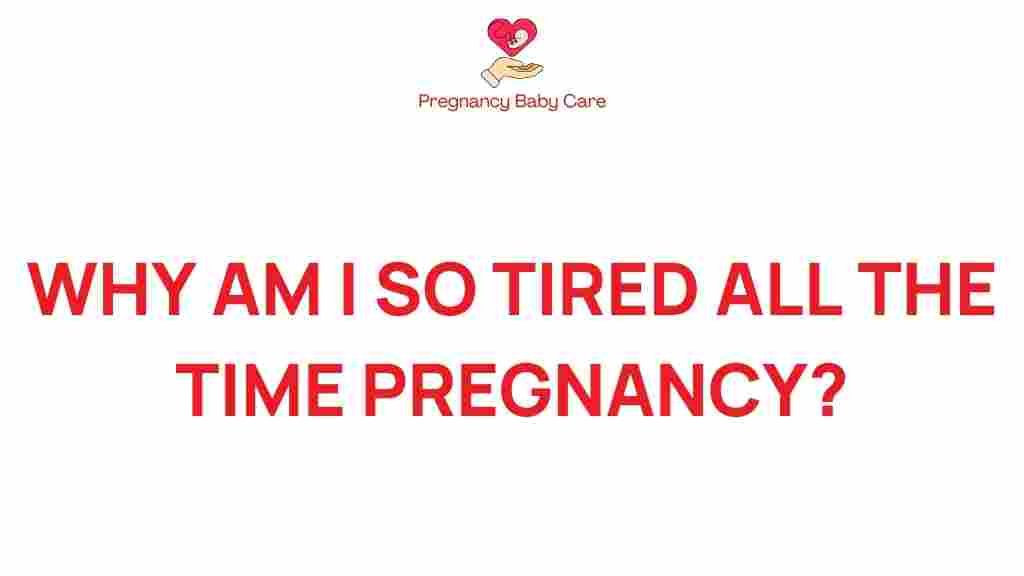Unraveling the Mystery: Why Am I So Tired During Pregnancy?
Pregnancy is a beautiful journey, but it often comes with unexpected challenges, one of the most common being pregnancy fatigue. Many expectant mothers report feeling more tired than ever before, leaving them to wonder why their energy levels have plummeted. Understanding the reasons behind tiredness in pregnancy can help you manage your energy and maintain your overall prenatal health. In this article, we will explore the causes of fatigue during pregnancy, how it affects maternal well-being, and what you can do to alleviate this exhausting symptom.
The Causes of Pregnancy Fatigue
Fatigue during pregnancy can be attributed to several factors, primarily hormonal changes, physical demands, and emotional stressors. Let’s delve into these aspects to gain a clearer picture:
- Hormonal Changes: Pregnancy triggers significant hormonal fluctuations, particularly in progesterone and estrogen. These hormonal changes can lead to increased tiredness and fatigue, especially in the first trimester.
- Physical Demands: As your body works hard to support the developing fetus, it requires more energy. The physical changes, such as weight gain and changes in posture, can also contribute to feelings of exhaustion.
- Sleep Disturbances: Many expectant mothers experience sleep disruptions due to discomfort, frequent urination, or anxiety, all of which can exacerbate feelings of tiredness during pregnancy.
- Emotional Stress: The emotional rollercoaster of pregnancy can be overwhelming. Anxiety about the future, changes in lifestyle, and preparation for the baby can all contribute to mental fatigue.
Understanding Pregnancy Fatigue
Understanding tiredness in pregnancy is crucial for managing it effectively. Fatigue can vary in intensity and frequency throughout your pregnancy. Here’s what you might expect:
- First Trimester: Many women report extreme fatigue during the first trimester, which can be linked to hormonal shifts and the body’s adjustment to pregnancy.
- Second Trimester: Fatigue often decreases as the body adapts, but some women still experience low energy levels due to physical changes.
- Third Trimester: As the baby grows, physical discomfort can return, leading to increased tiredness and sleep disturbances.
Step-by-Step Process to Combat Pregnancy Fatigue
While pregnancy fatigue can feel overwhelming, there are several strategies you can employ to help manage your energy levels. Here’s a step-by-step process:
1. Prioritize Sleep
Sleep is vital for maternal well-being. Aim for 7-9 hours of restful sleep each night. Here are some tips:
- Create a Sleep-Friendly Environment: Make your bedroom conducive to sleep by keeping it dark, quiet, and cool.
- Establish a Bedtime Routine: Engage in relaxing activities before bed, such as reading or taking a warm bath.
- Use Pillows for Comfort: Position pillows to support your back and belly for a more comfortable sleep.
2. Eat a Balanced Diet
Nutrition plays a crucial role in energy levels. Focus on a balanced diet rich in:
- Fruits and Vegetables: Provide essential vitamins and minerals.
- Whole Grains: Offer sustained energy throughout the day.
- Lean Proteins: Help repair body tissues and support fetal growth.
Additionally, consider smaller, more frequent meals to maintain steady energy levels.
3. Stay Hydrated
Dehydration can cause fatigue, so ensure you drink plenty of water throughout the day. Aim for at least 8-10 glasses of water daily, and adjust based on your activity level and climate.
4. Incorporate Gentle Exercise
While it may seem counterintuitive, gentle exercise can boost energy levels. Consider activities such as:
- Walking: A simple and effective way to increase energy.
- Yoga: Helps with relaxation and physical comfort.
- Swimming: Provides relief from physical strain and is low-impact.
5. Manage Stress
Finding ways to manage stress is essential. Techniques such as meditation, deep breathing exercises, or prenatal classes can help alleviate anxiety and improve your overall mood.
Troubleshooting Tips for Managing Fatigue
Despite your best efforts, you may still experience fatigue. If you find that your tiredness is unmanageable, consider the following troubleshooting tips:
1. Consult Your Healthcare Provider
If your fatigue feels excessive or is accompanied by other symptoms, it’s crucial to speak with your healthcare provider. They can rule out conditions like anemia or thyroid issues that may contribute to your tiredness.
2. Monitor Your Mental Health
Emotional well-being is vital during pregnancy. If you are feeling persistently anxious or depressed, seek help from a mental health professional.
Don’t hesitate to ask for help from your partner, family, or friends. Sharing household responsibilities can lighten your load and give you more time to rest.
4. Adjust Your Workload
If you are working, consider discussing your workload with your employer. Look for opportunities to modify your tasks or work hours to better accommodate your energy levels.
Conclusion
Experiencing pregnancy fatigue is a common challenge faced by many expectant mothers. By understanding the reasons behind tiredness in pregnancy—from hormonal changes to emotional stress—you can take proactive steps to manage your energy levels and maintain your prenatal health. Remember to prioritize sleep, nutrition, and emotional well-being during this transformative time. If you ever feel overwhelmed, don’t hesitate to seek support from healthcare professionals or loved ones.
For further reading on maintaining maternal well-being, check out this comprehensive guide on pregnancy wellness.
Pregnancy can be exhausting, but with the right strategies, you can navigate through fatigue and enjoy the journey ahead. Always listen to your body and give yourself the grace to rest when needed.
This article is in the category Pregnancy and created by PregnancyBabyCare Team
